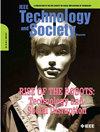Implications of Emotion Recognition Technologies: Balancing Privacy and Public Safety
IF 2.1
4区 工程技术
Q3 ENGINEERING, ELECTRICAL & ELECTRONIC
引用次数: 0
Abstract
As our world becomes increasingly interconnected, technology continues to evolve at an unprecedented pace. One of the most intriguing advancements in recent years is the development of emotion recognition technologies情感识别技术的启示:隐私与公共安全的平衡
随着我们的世界变得越来越相互联系,技术继续以前所未有的速度发展。近年来最有趣的进步之一是情绪识别技术的发展[1]。这些系统由用于机器推理和学习的人工智能算法提供动力,运行在复杂的硬件上,可以分析人类表情、音调和肢体语言,以识别和解释情绪[2]。虽然这项技术的潜在应用范围广泛,从心理健康支持[3]到增强客户体验[4],但它也引发了对个人隐私和公共安全的重大担忧。本文深入探讨了情绪识别技术的复杂含义,探索了改善公共安全的承诺和保护个人隐私之间的微妙平衡。
本文章由计算机程序翻译,如有差异,请以英文原文为准。
求助全文
约1分钟内获得全文
求助全文
来源期刊

IEEE Technology and Society Magazine
工程技术-工程:电子与电气
CiteScore
3.00
自引率
13.60%
发文量
72
审稿时长
>12 weeks
期刊介绍:
IEEE Technology and Society Magazine invites feature articles (refereed), special articles, and commentaries on topics within the scope of the IEEE Society on Social Implications of Technology, in the broad areas of social implications of electrotechnology, history of electrotechnology, and engineering ethics.
 求助内容:
求助内容: 应助结果提醒方式:
应助结果提醒方式:


